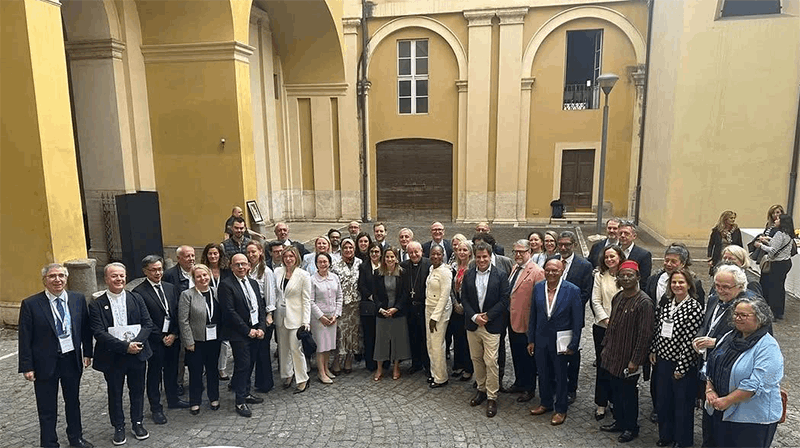 First photo caption: Professor Oscar Lopez, center, speaks with two attendees at “The Memory: A Symposium Addressing the Opportunities and Challenges of an Aging Population” held May 9 and 10 in Vatican City. Second photo caption: The Vatican City skyline. (Photos courtesy of AARP and Dr. Lopez.)
First photo caption: Professor Oscar Lopez, center, speaks with two attendees at “The Memory: A Symposium Addressing the Opportunities and Challenges of an Aging Population” held May 9 and 10 in Vatican City. Second photo caption: The Vatican City skyline. (Photos courtesy of AARP and Dr. Lopez.)
By Kat Procyk
Oscar Lopez, Levidow-Pittsburgh Foundation Professor of Alzheimer's Disease and Dementia Disorders, School of Medicine, and of clinical and translational science at the University of Pittsburgh, was among the global leaders and scientists invited to participate in “The Memory: A Symposium Addressing the Opportunities and Challenges of an Aging Population,” hosted by the Vatican and AARP May 9 and 10, 2025.
Lopez, director of the Alzheimer's Disease Research Center, was selected to participate because he is known as a leading authority on dementia.
The symposium was a priority for Pope Francis, who had signed off on its agenda and planned to attend but died in April 2025. The event coincided with a historic occasion: Pope Leo XIV’s first day as the new pope.
"We were so fortunate to be in Rome when the new pope was elected,” Lopez said. “Hearing the bells of all of Rome’s churches announcing Pope Leo XIV was a unique lifetime experience full of positive emotions.”
The event included meetings with doctors, scientists, academics, nongovernmental organizations (NGOs) and nonprofits from more than 20 countries to address global aging issues. The goal was to highlight the vital importance of memory, dignity and security for older adults, while urging leaders to prepare for rapid global aging—especially in low- and middle-income countries, where rising longevity and dementia will intersect with social and environmental challenges like inequality, pollution and isolation.
Sessions led by members of the World Health Organization, United Nations, Human Rights Watch and Alzheimer’s Association, centered on a wide range of topics like supporting family caregivers, economic implications, and addressing agism on a global scale.
During her address to the assembly, AARP CEO Myechia Minter-Jordan noted that one in five people worldwide will be older than 60 by 2050, yet support systems are not in place to meet the needs of an aging population.
“Aging is not a problem to solve,” Minter-Jordan said. “It is an opportunity to rethink how we support our communities.”
At the conclusion of the event, global leaders signed the Vatican City Declaration of the Pontifical Academy of Life – AARP – Muslim Council of Elders, formalizing an international commitment to advancing aging-related policies that safeguard the dignity and well-being of older generations.
“We agreed that we are on the verge of a significant social and medical problem that will require financial resources, not only for health issues but also for the training of caregivers who can help families take care of patients with dementia,” Lopez said.
Lopez’s work includes large-scale studies refining the clinical criteria for Alzheimer’s disease, vascular dementia and mild cognitive impairment (MCI). He coauthored the 2017 American Academy of Neurology Practice Guidelines for MCI and has made strides in identifying factors that influence the progression of normal cognition to dementia. He has authored or coauthored more than 500 peer-reviewed articles and currently oversees or contributes to 15 National Institutes of Health-funded studies.

